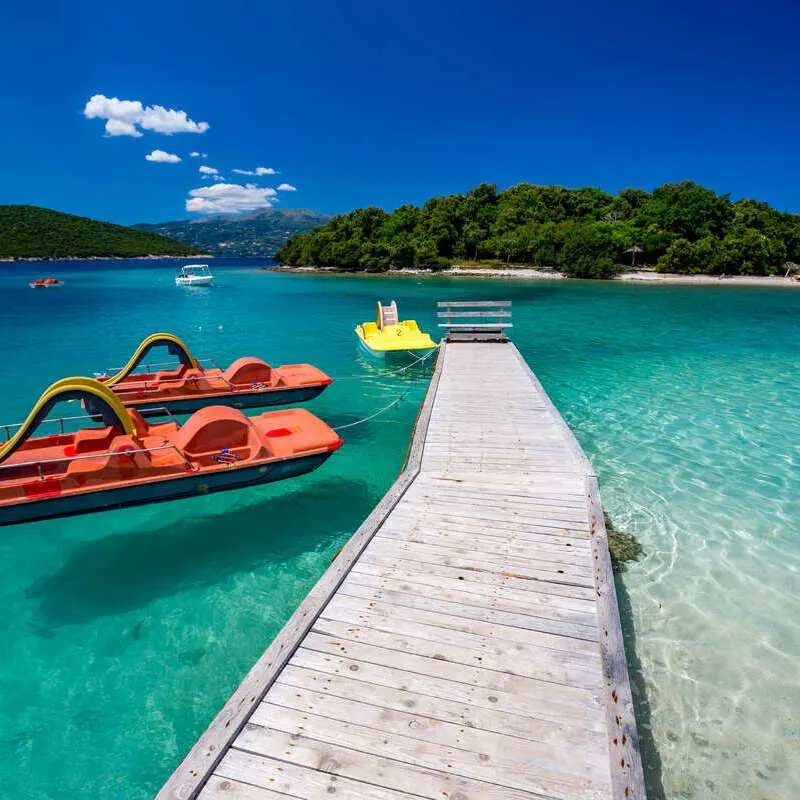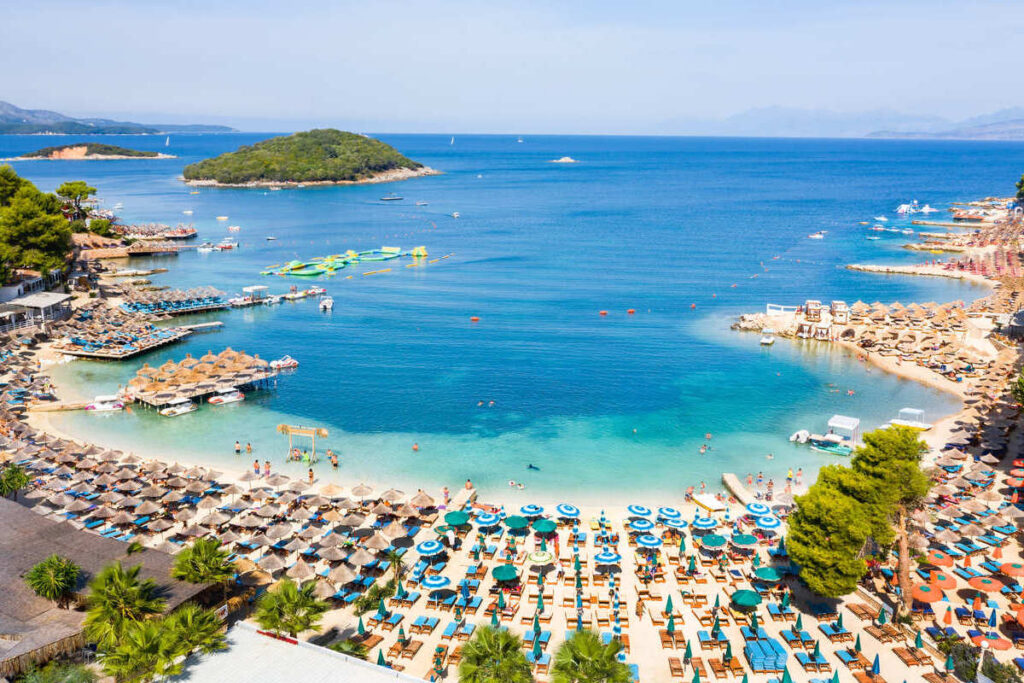Travel Guide
This Is The Cheapest Region Of The Mediterranean For Tourists
Last Updated
Home to some of the world’s oldest nations and being distinct for its turquoise waters, the Mediterranean is one of the most visited holiday destinations globally, drawing in millions of tourists year-round, but especially in the warmer months when it’s sunny out.


The only problem is that certain Mediterranean destinations can hit your wallet, from Ibiza, Spain’s leading leisure island, to Mykonos, the party capital of Greece, to Amalfi, Italy’s pristine coast dotted with colorful towns, all three of which are eye-wateringly expensive.
Luckily, not all Med spots have exorbitant prices, and though a majority of the most popular do, this region of the Ancient Sea is not only incredibly cheap to visit but arguably its most beautiful:
The Adriatic Is The Cheapest Part Of The Mediterranean


In case you didn’t know, the Mediterranean is divided into 11 parts, all bearing different names—Aegean, Ligurian, Balearic—but belonging to the same sea nonetheless.
One of those, the Adriatic, is bordered by some of Europe’s most budget-friendly countries.
The world may know the Adriatic as Italy’s ‘eastern’ coast, where the iconic dry stone, conical roof houses of Puglia, the resort city of Rimini, and the floating city of Venice are located, but across the narrow body of water, the Mediterranean’s northernmost lies the Balkan Peninsula.


The ‘Balkan’ countries comprise much of Southeastern Europe, with five of them straddling parts of the Adriatic coastline. They are close neighbors, but they have surprisingly distinct cultures, making the peninsula a melting pot of the sorts:
- Slovenia
- Croatia
- Bosnia and Herzegovina
- Montenegro
- Albania
Before we discuss prices, let’s briefly go through each one of them:
How Do Balkan Countries Compare?


Slovenia has the second shortest coastline in the Adriatic, at only 28 miles.
Due to its proximity to Austria and Hungary, it has more of a Central European character than a Mediterranean one.
Its neighbor to the south, Croatia, on the other hand, claims much of the Adriatic for itself.
As the meme goes, it’s almost as if Bosnians said they wanted to swim, and Croatia replied a sharp ‘no’: the Croatian coast comprises over 90% of the Balkan side of the Adriatic, getting narrower and narrower, all but fencing off Bosnia’s access to the sea.


Needless to say, Croatia is the leading Balkan destination, highly sought-after for its millennia-old Dalmatian cities, with Zadar, Split and Dubrovnik to name a few, paradisaical islands and pebbly beaches bounded by crystalline waters.
Bosnia does have a coast, albeit a 12-mile long one (they’ve got Croatia to thank for that), leaving Montenegro, the next country in line, as Croatia’s strongest competitor.
Stone-built, cobblestone-laden towns, scenic beaches, you know how it goes.


Finally, at the southern end of Montenegro’s 183-mile-long coast, we have Albania, the Adriatic’s best-kept secret, where tourists will find sandy beaches, which are surprisingly rare in this part of the Mediterranean, and most importantly, significantly lower consumer prices.
Adriatic Countries Are Remarkably Cheap
Speaking of affordability – we know this is what you came here for – we’re not sure you’ve realized this by now, but a vacation in the Adriatic will hardly break the bank.
That is, if you’re sticking to the Balkans and avoiding Italy altogether:


Balkan Adriatic states are remarkably affordable: in Montenegro, ordering a cevapi – a minced meat flatbread bap served with onions – and a drink at an inexpensive restaurant will cost you less than ten bucks on average, and the same goes for Bosnia and Herzegovina:
It makes up for its lack of an extensive coast with cheap eats – eating in inexpensive restaurants will set you back a mere $5 on average each time – and accommodation, as cheap as $26 per night on average, according to Budget Your Trip.


Croatia is probably the most expensive of all, being dubbed a ‘mini Italy’ due to its rising cost of living, but if you’re willing to sacrifice some comfort, you should expect to pay only $25 for a dorm bed, and there’s plenty of delicious, $3 takeaway calzoni to be had in downtown Split.
Slovenia is not that cheap either: the official currency is the euro, and it’s a developed country that enjoys high standards of living.
That being said, an overnight at the three-star Art Hotel in Piran, part of the Slovenian Riviera and Split without the crowds, costs an acceptable $82 per adult.


You’re probably not coming all the way to the Mediterranean to sleep in hostels and be frugal, however, and that’s why you should consider spending most of your time in budget traveler paradise Albania instead:
Albania Is The Cheapest Country Out Of Them All
This is the cheapest Balkan country by a mile, and somewhere you go to escape the crowds in Croatia and Montenegro and live it up in a resort by the sea without depleting your own savings.
Don’t believe us? Check these out:


You can book a standard double room with a pool view at the Adriatik Hotel, part of the BW Premier Collection in Durres, one of Albania’s liveliest coastal cities, for only $104 this spring per adult, or the majestic Santa Quaranta Premium Resort in Sarande for $56 each as a couple.
Sarande is part of the Albanian Riviera, where rare, white-sand Balkan beaches are concentrated.
It’s the perfect home for exploring the southern provinces of the country, which are famous not only for their swimming sites but also for their Greco-Roman ruins.


Eating out in Sarande, you’ll likely see your account balance decrease by a negligible $20 per day, unless you’re actively looking to splurge on fine dining, and in that case, it’s still approximately $46 you’ll be billed.
Yep, Albania is dirt cheap.
Why Are Adriatic Vacations So Cheap?
You may be wondering why vacations in the Adriatic Sea are so cheap when island-hopping in super yachts around the Aegean or partying in the Balearics seems to be reserved for the super-wealthy only, but there’s a simple answer to this:


Most Balkan countries are years behind in development compared to their European counterparts, and in the case of Bosnia and Herzegovina, Montenegro, and Albania, they’re not members of the economic powerhouse that is the European Union.
In general, Western countries provide more complex social protections, be it in the form of benefits or robust worker rights.
Not to mention, local purchasing power is elevated. Taxes are much higher, too, as the welfare state and living standards need to be upheld.


To put it simply, the Balkans are poorer countries – most notably Bosnia and Albania – with lower consumer prices, at least for the odd American visitor. It’s not that prices are particularly low for locals themselves.
It’s the weaker currency that makes your tourist dollars stretch much further.
$1 equals 0.011 Albanian lek, for instance, and judging by the country’s mininum wage, set at a disparaging $421, you soon begin to understand how a Mediterranean gem boasting immense cultural value and gorgeous beaches can be such a bargain.
↓ Join Our Community ↓
The Travel Off Path Community FB group has all the latest travel news, conversations, and Q&A’s happening daily!


SUBSCRIBE TO OUR LATEST POSTS
Enter your email address to subscribe to Travel Off Path’s latest breaking travel news, straight to your inbox.
This article originally appeared on TravelOffPath.com
Opinions expressed here are the author’s alone, not those of any bank, credit card issuer, hotel, airline, or other entity. This content has not been reviewed, approved or otherwise endorsed by any of the entities included within the post.
Source link

